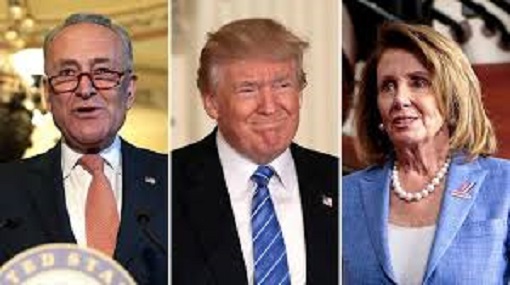
Elliott R. Morss ©All Rights Reserved
Introduction
As long as I can remember, the Republican Party reflected the interests of the wealthy, wanted small government and promoted trickle-down to take care of the rest. The Democratic Party said trickle-down did not work. It supported the working class/poorer groups and larger government. But history indicates tells us party realignments occur regularly. For example, southern Democrats became Republicans following the enactment of the Civil Rights legislation. And most recently, many Democrats, feeling the party had let them down, took a chance and voted for Trump. In what follows, I speculate on how all this will play out.
Trump Is Not a Republican
Trump has no party allegiance. Unlike members of the Republican Party, Trump cares about maintaining the confidence of the poorly educated, low income Democratic voters who switched over to vote for him. The interests of these people are antithetical to those of traditional Republicans and there is no apparent way to reconcile the differences. The first test of this came on the health care bill. Predictably, the Republicans wanted to reduce costs by reducing the numbers covered and what the insurance paid for. Trump said the Republican bill was “mean.” Trump wanted a health care bill passed so he could claim a victory but not one that represented traditional Republican interests.
One other issue “muddies” the water further. Trump is not a “details” person. But with the exception of his State and Defense Secretaries, his Cabinet appointments – the “details” people - are traditional Republicans. This group, along with his Vice President, has little compassion for Trump’s relatively uneducated supporters. The result: Trump’s “details” people, along with the Republican leaders in Congress, keep coming up with programs and policies that appeal to other Republicans. And in what follows, I look at upcoming Trump initiatives. In all likelihood, these initiatives will make the disconnect with the Republican Party even more apparent.
1. Tax Reform
Trump wants to make sure the “middle class” gets a tax cut while the Republicans want to make sure the taxes on the wealthy come down. Here is what Trump has said (with items Republicans will not like in bold):
- Every income group receives a tax cut, with millions more being removed from the income tax rolls and low-income Americans paying no income tax at all;
- He wants to eliminate the carried interest loophole for Wall Street.
An aside: Trump claims his tax cut will stimulate enough growth to make up the revenue losses from the tax cuts – this is a very “Republican” claim. However, history tells us this is nonsense. The Tax Foundation’s assessment is that between 2016 and 2025, Trump’s proposed tax cuts will cost $2.6 to $3.9 trillion in lost revenues.
2. Health Care
Trump ran on getting rid of Obama’s Affordable Care Act. Republicans supported him because they wanted to bring down health costs by reducing the numbers covered and coverage mandates. But when you look at the specific changes that Trump has suggested, you find very few that Obamacare supporters would find problematic. Here are Trump’s specific suggestions:
- Modify existing law that inhibits the sale of health insurance across state lines;
- Allow individuals to fully deduct health insurance premium payments from their tax returns under the current tax system;
- Review basic options for Medicaid and work with states to ensure that those who want healthcare coverage can have it;
- Allow individuals to use Health Savings Accounts (HSAs). Contributions into HSAs should be tax-free and should be allowed to accumulate;
- Require price transparency from all healthcare providers, especially doctors and healthcare organizations like clinics and hospitals.
- Individuals should be able to shop to find the best prices for procedures, exams or any other medical-related procedure;
- Remove barriers to entry into free markets for drug providers that offer safe, reliable and cheaper products. Congress will need the courage to step away from the special interests and do what is right for America;
- Allow consumers’ access to imported, safe and dependable drugs from overseas will bring more options to consumers.
- Eliminate the individual mandate: no person should be required to buy insurance unless he or she wants to;
- Block-grant Medicaid to the states. The state governments know their people best and can manage the administration of Medicaid far better without federal overhead;
Obamacare supporters want health costs to come down and consequently favor all but the last two items on this list.
3. Energy
One of Trump’s great primary claims was that he was going to get coal miners back to work by making coal mining profitable again. He sees coal miners and other displaced energy workers as part of his support base. So, his platform is to:
- Unleash America’s $50 trillion in untapped shale, oil, and natural gas reserves, plus hundreds of years in clean coal reserves.
- Become, and stay, totally independent of any need to import energy from the OPEC cartel or any nations hostile to our interests.
- Open onshore and offshore leasing on federal lands, eliminate moratorium on coal leasing, and open shale energy deposits.
- Encourage the use of natural gas and other American energy resources that will both reduce emissions but also reduce the price of energy and increase our economic output.
- Rescind all job-destroying Obama executive actions.
- Reduce and eliminate all barriers to responsible energy production, creating at least a half million jobs a year, $30 billion in higher wages, and cheaper energy.
Trump’s Cabinet appointments to the Energy Department and the Environmental Protection Agency are closely aligned with him on achieving these goals. This is probably the one area where Trump is very closely aligned with Republicans and strongly opposed by Democrats. However, the move towards renewable energy appears to have caught on worldwide. And by not being fully involved, Trump will be doing a real disservice to the US renewable energy companies. The good news? Trump is “flexible” and could change his position as it becomes increasingly untenable.
4. Trade
Trump campaigned on the following trade points:
- Withdraw from the Trans-Pacific Partnership, which has not yet been ratified;
- Appoint tough and smart trade negotiators to fight on behalf of American workers;
- Direct the Secretary of Commerce to identify every violation of trade agreements a foreign country is currently using to harm our workers, and also direct all appropriate agencies to use every tool under American and international law to end these abuses;
- Eliminate Mexico’s one-side backdoor tariff through the VAT and end sweatshops in Mexico that undercut U.S. workers;
- Instruct the Treasury Secretary to label China a currency manipulator;
- Instruct the U.S. Trade Representative to bring trade cases against China, both in this country and at the WTO. China’s unfair subsidy behavior is prohibited by the terms of its entrance to the WTO;
- Use every lawful presidential power to remedy trade disputes if China does not stop its illegal activities, including its theft of American trade secrets.
All of these make Republicans quite uneasy as they have traditionally favored free trade. In contrast, these are rallying points for Democrats who have put protecting American workers ahead of all other trade considerations.
5. Infrastructure
During the primary and after, Trump has been outspoken on the need for a massive overhaul to the country’s infrastructure. This involved upgrading U.S. roads, bridges, airports and other public works. Both Republicans and Democrats are supportive of this initiative. Trump has talked about a $1 trillion program. Many Republicans are concerned about its budget implications, just as are over health and tax reform costs. Some Republicans have said they will not vote for any new programs without information on how they will be financed. These issues became even more problematic when the anticipated government savings from repealing the Affordable Care Act did not materialize. Democrats are less concerned about a growing US deficit.
6. Foreign Policy
Republicans have traditionally been supporters of using the military to solve overseas “problems.” And while Trump talks about strengthening the military, he continues to emphasize that the US should stop nation-building and negotiate with Putin. In short, stop going to war! There are many Democrats who agree with Trump on this.
7. Immigration - DACA
In urging Congress to pass legislation allowing “Dreamers” to remain in the US, Trump is taking a real chance with his support base. Many Republicans do not like this, nor do the ex-Democratic members of his support base. In contrast, the Democrats are surprised but pleased that he has changed his mind on this issue.
8. Personalities
It has been widely reported that Trump does not personally like Ryan or McConnell. In contrast, Trump and Schumer are both Manhattanites. They appear to get on and “speak the same language.”
How Will It All Work Out?
It goes without saying that Trump is unpredictable. But it is clear that Trump wants to be liked and loves to “win.” And is that really any different than Lyndon Johnson? And as a President, Johnson he worked out pretty well. Will Trump remain pragmatic and put together alliances without regard to party to get things done? Or will he switch parties? Time will tell.



